Units1-2知识点汇总及练习(含解析)2023-2024学年牛津译林版英语八年级下册
文档属性
| 名称 | Units1-2知识点汇总及练习(含解析)2023-2024学年牛津译林版英语八年级下册 |
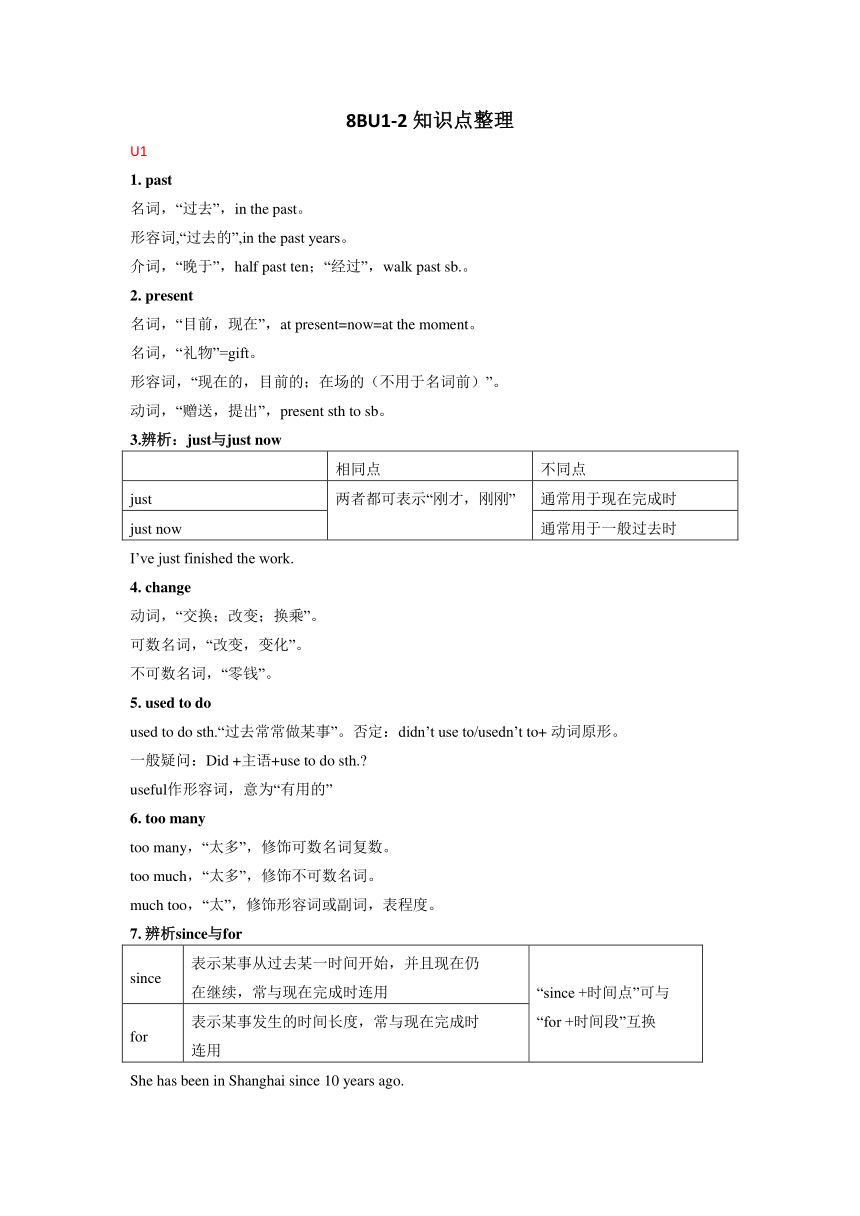
|
|
| 格式 | docx | ||
| 文件大小 | 33.3KB | ||
| 资源类型 | 教案 | ||
| 版本资源 | 牛津译林版 | ||
| 科目 | 英语 | ||
| 更新时间 | 2024-05-14 00:00:00 | ||
图片预览

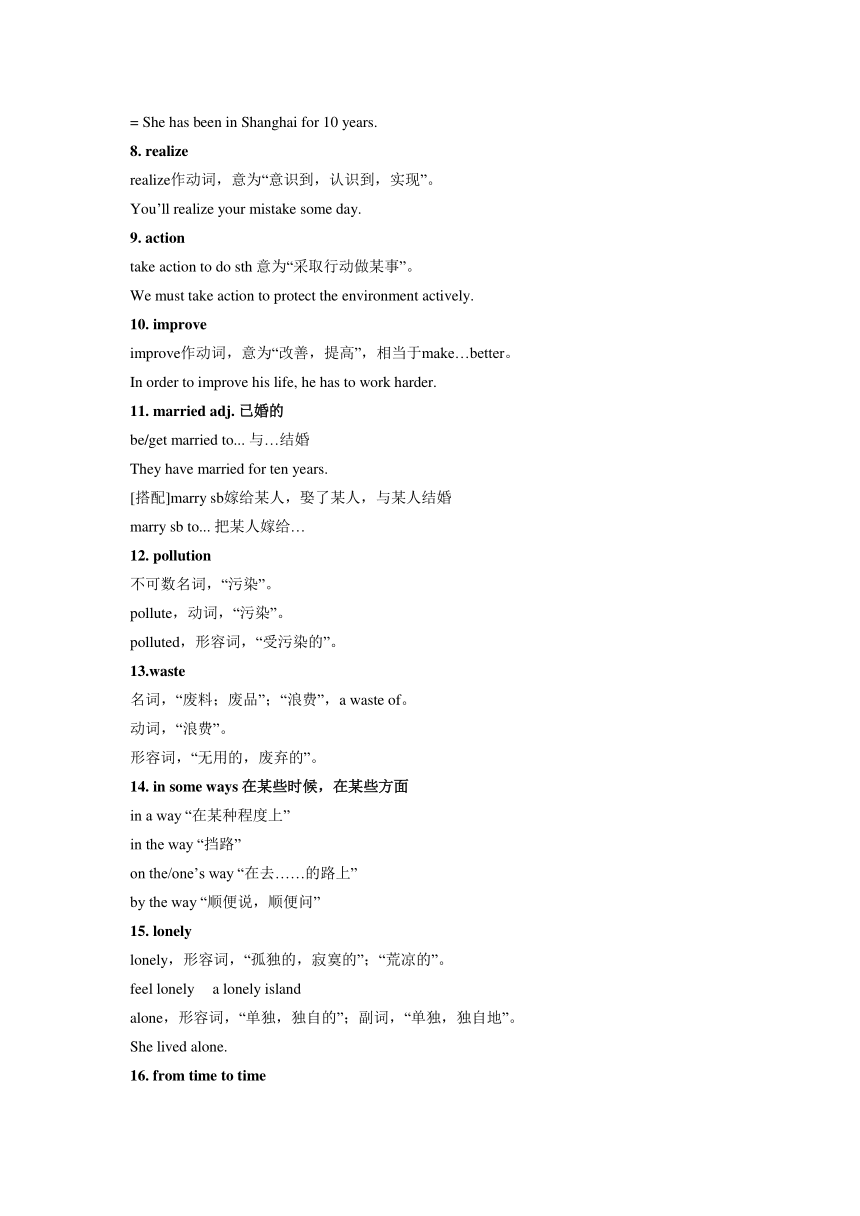
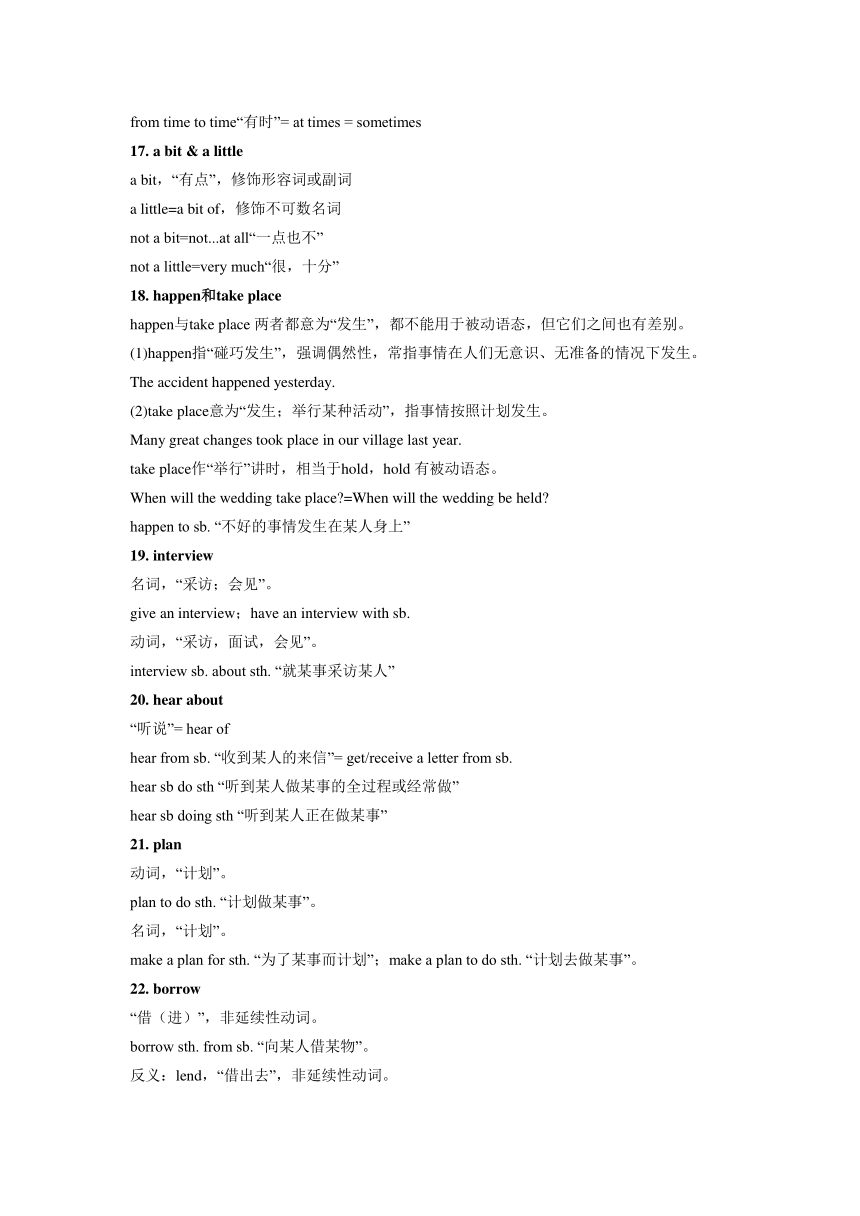
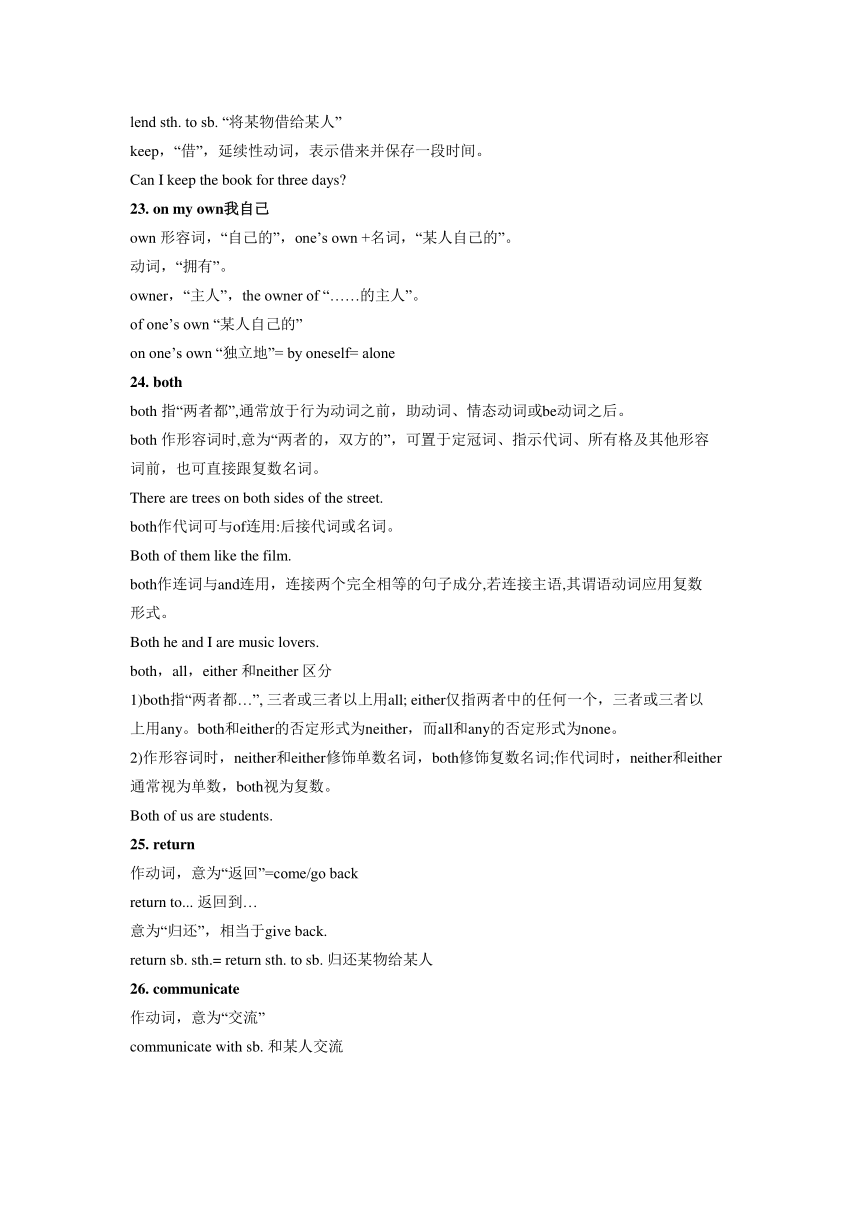
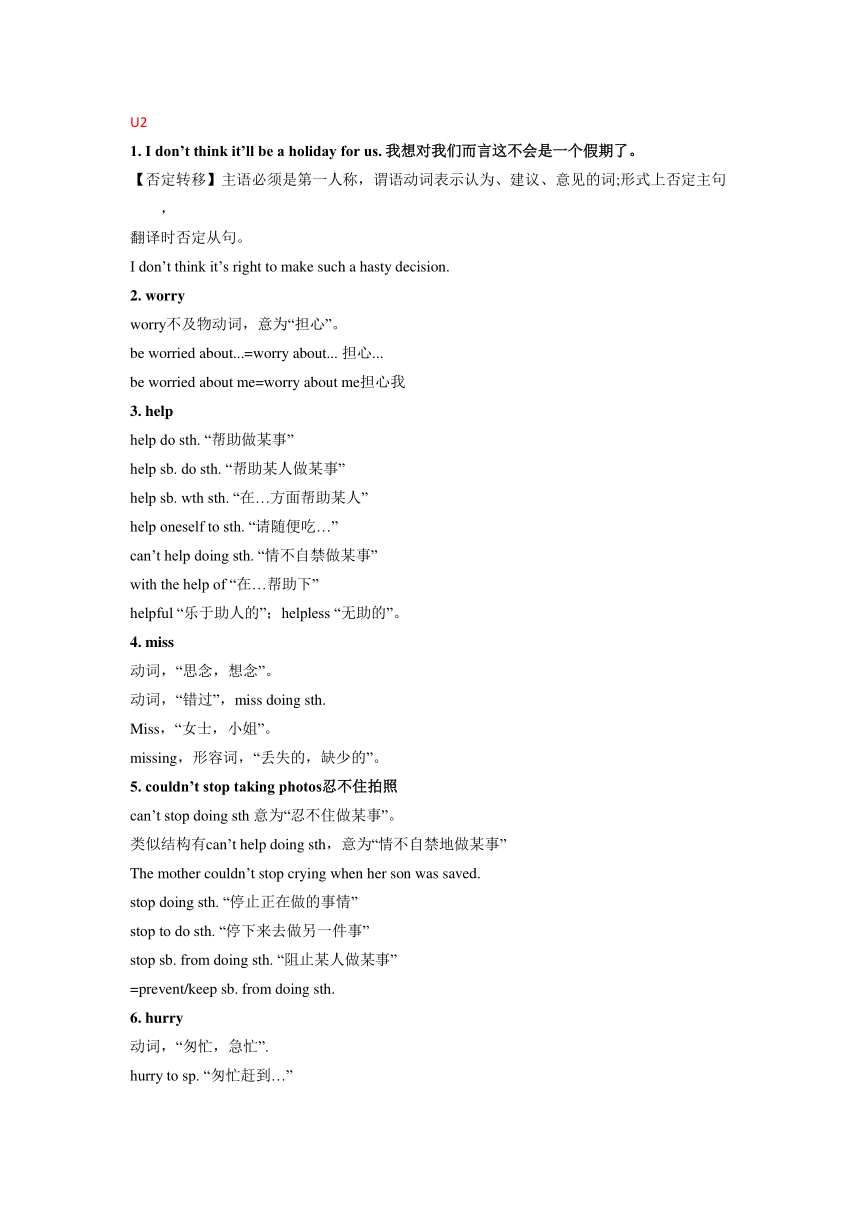
文档简介
8BU1-2知识点整理
U1
1. past
名词,“过去”,in the past。
形容词,“过去的”,in the past years。
介词,“晚于”,half past ten;“经过”,walk past sb.。
2. present
名词,“目前,现在”,at present=now=at the moment。
名词,“礼物”=gift。
形容词,“现在的,目前的;在场的(不用于名词前)”。
动词,“赠送,提出”,present sth to sb。
3.辨析:just与just now
相同点 不同点
just 两者都可表示“刚才,刚刚” 通常用于现在完成时
just now 通常用于一般过去时
I’ve just finished the work.
4. change
动词,“交换;改变;换乘”。
可数名词,“改变,变化”。
不可数名词,“零钱”。
5. used to do
used to do sth.“过去常常做某事”。否定:didn’t use to/usedn’t to+ 动词原形。
一般疑问:Did +主语+use to do sth.
useful作形容词,意为“有用的”
6. too many
too many,“太多”,修饰可数名词复数。
too much,“太多”,修饰不可数名词。
much too,“太”,修饰形容词或副词,表程度。
7. 辨析since与for
since 表示某事从过去某一时间开始,并且现在仍 在继续,常与现在完成时连用 “since +时间点”可与 “for +时间段”互换
for 表示某事发生的时间长度,常与现在完成时 连用
She has been in Shanghai since 10 years ago.
= She has been in Shanghai for 10 years.
8. realize
realize作动词,意为“意识到,认识到,实现”。
You’ll realize your mistake some day.
9. action
take action to do sth 意为“采取行动做某事”。
We must take action to protect the environment actively.
10. improve
improve作动词,意为“改善,提高”,相当于make…better。
In order to improve his life, he has to work harder.
11. married adj. 已婚的
be/get married to... 与…结婚
They have married for ten years.
[搭配]marry sb嫁给某人,娶了某人,与某人结婚
marry sb to... 把某人嫁给…
12. pollution
不可数名词,“污染”。
pollute,动词,“污染”。
polluted,形容词,“受污染的”。
13.waste
名词,“废料;废品”;“浪费”,a waste of。
动词,“浪费”。
形容词,“无用的,废弃的”。
14. in some ways 在某些时候,在某些方面
in a way “在某种程度上”
in the way “挡路”
on the/one’s way “在去……的路上”
by the way “顺便说,顺便问”
15. lonely
lonely,形容词,“孤独的,寂寞的”;“荒凉的”。
feel lonely a lonely island
alone,形容词,“单独,独自的”;副词,“单独,独自地”。
She lived alone.
16. from time to time
from time to time“有时”= at times = sometimes
17. a bit & a little
a bit,“有点”,修饰形容词或副词
a little=a bit of,修饰不可数名词
not a bit=not...at all“一点也不”
not a little=very much“很,十分”
18. happen和take place
happen与take place 两者都意为“发生”,都不能用于被动语态,但它们之间也有差别。
(1)happen指“碰巧发生”,强调偶然性,常指事情在人们无意识、无准备的情况下发生。
The accident happened yesterday.
(2)take place意为“发生;举行某种活动”,指事情按照计划发生。
Many great changes took place in our village last year.
take place作“举行”讲时,相当于hold,hold 有被动语态。
When will the wedding take place =When will the wedding be held
happen to sb. “不好的事情发生在某人身上”
19. interview
名词,“采访;会见”。
give an interview;have an interview with sb.
动词,“采访,面试,会见”。
interview sb. about sth. “就某事采访某人”
20. hear about
“听说”= hear of
hear from sb. “收到某人的来信”= get/receive a letter from sb.
hear sb do sth “听到某人做某事的全过程或经常做”
hear sb doing sth “听到某人正在做某事”
21. plan
动词,“计划”。
plan to do sth. “计划做某事”。
名词,“计划”。
make a plan for sth. “为了某事而计划”;make a plan to do sth. “计划去做某事”。
22. borrow
“借(进)”,非延续性动词。
borrow sth. from sb. “向某人借某物”。
反义:lend,“借出去”,非延续性动词。
lend sth. to sb. “将某物借给某人”
keep,“借”,延续性动词,表示借来并保存一段时间。
Can I keep the book for three days
23. on my own我自己
own 形容词,“自己的”,one’s own +名词,“某人自己的”。
动词,“拥有”。
owner,“主人”,the owner of “……的主人”。
of one’s own “某人自己的”
on one’s own “独立地”= by oneself= alone
24. both
both 指“两者都”,通常放于行为动词之前,助动词、情态动词或be动词之后。
both 作形容词时,意为“两者的,双方的”,可置于定冠词、指示代词、所有格及其他形容
词前,也可直接跟复数名词。
There are trees on both sides of the street.
both作代词可与of连用:后接代词或名词。
Both of them like the film.
both作连词与and连用,连接两个完全相等的句子成分,若连接主语,其谓语动词应用复数
形式。
Both he and I are music lovers.
both,all,either 和neither 区分
1)both指“两者都…”, 三者或三者以上用all; either仅指两者中的任何一个,三者或三者以
上用any。both和either的否定形式为neither,而all和any的否定形式为none。
2)作形容词时,neither和either修饰单数名词,both修饰复数名词;作代词时,neither和either
通常视为单数,both视为复数。
Both of us are students.
25. return
作动词,意为“返回”=come/go back
return to... 返回到…
意为“归还”,相当于give back.
return sb. sth.= return sth. to sb. 归还某物给某人
municate
作动词,意为“交流”
communicate with sb. 和某人交流
U2
1. I don’t think it’ll be a holiday for us. 我想对我们而言这不会是一个假期了。
【否定转移】主语必须是第一人称,谓语动词表示认为、建议、意见的词;形式上否定主句,
翻译时否定从句。
I don’t think it’s right to make such a hasty decision.
2. worry
worry不及物动词,意为“担心”。
be worried about...=worry about... 担心...
be worried about me=worry about me担心我
3. help
help do sth. “帮助做某事”
help sb. do sth. “帮助某人做某事”
help sb. wth sth. “在…方面帮助某人”
help oneself to sth. “请随便吃…”
can’t help doing sth. “情不自禁做某事”
with the help of “在…帮助下”
helpful “乐于助人的”;helpless “无助的”。
4. miss
动词,“思念,想念”。
动词,“错过”,miss doing sth.
Miss,“女士,小姐”。
missing,形容词,“丢失的,缺少的”。
5. couldn’t stop taking photos忍不住拍照
can’t stop doing sth 意为“忍不住做某事”。
类似结构有can’t help doing sth,意为“情不自禁地做某事”
The mother couldn’t stop crying when her son was saved.
stop doing sth. “停止正在做的事情”
stop to do sth. “停下来去做另一件事”
stop sb. from doing sth. “阻止某人做某事”
=prevent/keep sb. from doing sth.
6. hurry
动词,“匆忙,急忙”.
hurry to sp. “匆忙赶到…”
hurry up “快点”
名词,“匆忙”,in a hurry “匆匆忙忙”。
7. dead 形容词,“死的”。
die,动词,“死亡”。
death,名词,“死亡”。
dying,形容词,“奄奄一息的”。
8. another“另一个,再一个”,用于三个及以上。
one...the other...“一个……另一个……”
some...others...“一些……,另一些……(并非全部)”
some...the others....“一些……另一些(剩下的全部)……”
“another+数词+可数名词复数”= “数词+more+可数名词复数”
9. have/has been in
have/has been in/at “在某地多长时间”+一段时间的状语
have/has been to“已经去过某地”(去了已回)
have/has gone to“已经去了某地”(去了未回)
10. for example
“例如”,一般以同类事物或人中的“一类”为例。
such as,“例如”,用来列举同类人或事物中的几个例子。
11. advice
作不可数名词,意为“建议”。
a piece of advice “一则建议”
advise作动词,意为“建议”。
advise sb. (not) to do sth. “建议某人(不)做某事”
advise doing sth. “建议做某事”
同步练习
一、单项填空
1. She often helped Danny ___________ his illness.
A. during B. at C. to D. down
2. I’d like to ___________ a book on computer technology from the library.
A. lend B. borrow C. use D. buy
3. Maria is a good child. She often ___________ others.
A. offers to help B. offers helping C. asks help D. asks to help
4. Mo Yan ___________ the Nobel Prize for literature in 2012.
A. beat B. took C. won D. bought
5. I can’t watch TV until I finish ___________ my homework.
A. doing B. to do C. do D. to doing
6. Let’s play table tennis ___________ Tuesday morning, shall we
A. on B. in C. to D. at
7. During this year’s Reading Week, I read the most books in our class. No one reads __________ books than I.
A. many B. more C. few D. fewer
8. Look! Some students are ___________ books in the bookstore.
A. looking after B. looking up C. looking through D. looking out
9. — I ___________ 5,000 yuan on this iPhone.
— Wow, so much! I can’t afford it.
A. spent B. paid C. cost D. took
10. — How often do you see your parents
— ___________.
A. Five days B. Twice a month C. In a week D. Three times
11. Of all the girls, Lisa danced ___________. She won the first prize.
A. good B. well C. best D. better
12. — Tim played the guitar very well in the school talent show.
— I think so. He practices ___________ it every day.
A. play B. playing C. to play D. plays
13. I bought ___________ exercise books with ___________ money.
A. a few; a few B. a few; a little C. a little; a few D. a little; a little
14. — Must I do my homework now, Mum
— ___________. You can do it tomorrow.
A. No, you needn’t B. No, you mustn’t C. Yes, you need D. Yes, you must
15. It’s raining outside. ___________ your raincoat before you go out.
A. Put on B. Wear C. In D. Dress
二、完形填空
There was a time when Cindy didn't have many friends.She was very 1 .She never really wanted to be popular,but she wanted to have someone share secrets and happiness 2 .But she didn’t find a friend in her high school.When it was time to go to college(大学),Cindy was quite 3 .She was going to live with someone she didn't 4 and to live in a town 300 miles away from 5 .She had no idea how to make 6 in the college.In her first English class,the teacher asked each student a question,“What is your goal(目标)for this class ”Most of the students said it was to get a good 7 ,but she said something quite 8 .She said that her goal was to make just one good friend.Then one student came to Cindy and asked if she would be her friend.Cindy 9 .Cindy learned that if she 10 something,she should ask for it and be honest.
1.A.bored B.tired C.clever D.shy
2.A.in B.with C.to D.from
3.A.happy B.careful C.nervous D.excited
4.A.know B.understand C.like D.miss
5.A.school B.home C.college D.there
6.A.food B.money C.friends D.cakes
7.A.friend B.grade C.life D.class
8.A.strange B.great C.difficult D.different
9.A.smiled B.shouted C.changed D.talked
10.A.wants B.dislikes C.finds D.becomes
一、单项填空
【答案】A。
【解析】during his illness意为“在他生病期间”。
2. 【答案】B。
【解析】borrow sth. from意为“从某处借……”。
3. 【答案】A。
【解析】offer to do sth.意为“主动提出做某事”。
4. 【答案】C。
【解析】win the prize意为“获奖”。
5. 【答案】A。
【解析】finish doing sth.意为“完成某事”。
6. 【答案】A。
【解析】on Tuesday morning意为“在周二上午”,在某一天的上午、下午、晚上用介词on。
7. 【答案】B。
【解析】根据前句的“我在班里读书最多”,可知没有人比我读得多。
8. 【答案】C。
【解析】look through意为“浏览”。look after照看;look up(在字典、参考书中)查询所需的信息;look out向外看。
9. 【答案】A。
【解析】spend…on…意为“在某物上花费……”,且主语必须是人。
10. 【答案】B。
【解析】how often 意为“多久一次”,对频率提问,所以答语为”一个月两次”,符合句意。
11. 【答案】C。
【解析】根据of all the girls可知本句用最高级。
12. 【答案】B。
【解析】practice doing sth.意为“练习做某事”。
13. 【答案】B。
【解析】a few修饰可数名词;a little修饰不可数名词。exercise books是可数名词;money不可数。
14. 【答案】A。
【解析】must提问的句子,否定回答要用needn’t。
15. 【答案】A。
【解析】本句是祈使句,要用动词原形开头,排除C;put on 强调动作;wear强调状态;dress后一般接人,所以答案为A。
完形填空
【答案】D。
【解析】由下一句可知,Cindy从来没有想在同学中很受欢迎,由此可猜测本句是说她很
害羞,故选shy。
【答案】B。
【解析】share sth.with sb.意为“和某人分享某物”。
3.【答案】C。
【解析】由上一句可知,Cindy在高中没有找到朋友,此处是指当快要上大学时,Cindy很
紧张。nervous意为“紧张的”。
4.【答案】A。
【解析】在大学里Candy将要和不认识的人在一块儿居住生活。know意为“认识,知道”。
5.【答案】B。
【解析】Cindy将要去距离“家”300英里的镇上上学。
6.【答案】C。
【解析】文章开头说Cindy有一段时间没有朋友,故本句应该表达她不知道如何交朋友。
make friends意为“交朋友”。
7.【答案】B。
【解析】很多人上课的目标是取得好成绩,所以此处是指大部分人都回答自己的目标是取得
好成绩(grade)。
8.【答案】D。
【解析】由下一句可知,Cindy回答的是交一个好朋友,所以她和别人回答的“不同”,故选
different。
9.【答案】A。
【解析】 Cindy交到朋友了,所以她“笑”了。
10.【答案】A。
【解析】本句意为:Cindy学到了如果想要什么就应该寻求它并且要诚实。A项符合句意。
三、阅读理解
【答案】C
词句猜测题。根据“He has been recognized as the oldest male to surf(冲浪)by the Guinness World Records.”可知,他被吉尼斯世界纪录认定为年龄最大的男性冲浪者。recognized意为“认定”,与accepted同义。故选C。
2. 【答案】B
段落大意题。根据“His secret to keep healthy and energetic, he said, was surfing. So, Sano found a teacher.”可知,第三段讲述他尝试去冲浪的原因。故选B。
3. 【答案】A
推理判断题。根据“I think age doesn’t matter in surfing”和“To be honest, I was surprised by his age”可知,师生们很佩服他冲浪没有受到年龄的限制,可推测他们都很尊重他。故选A。
4. 【答案】D
推理判断题。根据“Surfing helps make him less stressed. ‘People often say that surfing is life itself,’ he said. ‘I think it is true.’”可知,冲浪有助于减轻他的压力。他认同“冲浪就是生活本身”这种说法,说明他很喜欢冲浪。故选D。
U1
1. past
名词,“过去”,in the past。
形容词,“过去的”,in the past years。
介词,“晚于”,half past ten;“经过”,walk past sb.。
2. present
名词,“目前,现在”,at present=now=at the moment。
名词,“礼物”=gift。
形容词,“现在的,目前的;在场的(不用于名词前)”。
动词,“赠送,提出”,present sth to sb。
3.辨析:just与just now
相同点 不同点
just 两者都可表示“刚才,刚刚” 通常用于现在完成时
just now 通常用于一般过去时
I’ve just finished the work.
4. change
动词,“交换;改变;换乘”。
可数名词,“改变,变化”。
不可数名词,“零钱”。
5. used to do
used to do sth.“过去常常做某事”。否定:didn’t use to/usedn’t to+ 动词原形。
一般疑问:Did +主语+use to do sth.
useful作形容词,意为“有用的”
6. too many
too many,“太多”,修饰可数名词复数。
too much,“太多”,修饰不可数名词。
much too,“太”,修饰形容词或副词,表程度。
7. 辨析since与for
since 表示某事从过去某一时间开始,并且现在仍 在继续,常与现在完成时连用 “since +时间点”可与 “for +时间段”互换
for 表示某事发生的时间长度,常与现在完成时 连用
She has been in Shanghai since 10 years ago.
= She has been in Shanghai for 10 years.
8. realize
realize作动词,意为“意识到,认识到,实现”。
You’ll realize your mistake some day.
9. action
take action to do sth 意为“采取行动做某事”。
We must take action to protect the environment actively.
10. improve
improve作动词,意为“改善,提高”,相当于make…better。
In order to improve his life, he has to work harder.
11. married adj. 已婚的
be/get married to... 与…结婚
They have married for ten years.
[搭配]marry sb嫁给某人,娶了某人,与某人结婚
marry sb to... 把某人嫁给…
12. pollution
不可数名词,“污染”。
pollute,动词,“污染”。
polluted,形容词,“受污染的”。
13.waste
名词,“废料;废品”;“浪费”,a waste of。
动词,“浪费”。
形容词,“无用的,废弃的”。
14. in some ways 在某些时候,在某些方面
in a way “在某种程度上”
in the way “挡路”
on the/one’s way “在去……的路上”
by the way “顺便说,顺便问”
15. lonely
lonely,形容词,“孤独的,寂寞的”;“荒凉的”。
feel lonely a lonely island
alone,形容词,“单独,独自的”;副词,“单独,独自地”。
She lived alone.
16. from time to time
from time to time“有时”= at times = sometimes
17. a bit & a little
a bit,“有点”,修饰形容词或副词
a little=a bit of,修饰不可数名词
not a bit=not...at all“一点也不”
not a little=very much“很,十分”
18. happen和take place
happen与take place 两者都意为“发生”,都不能用于被动语态,但它们之间也有差别。
(1)happen指“碰巧发生”,强调偶然性,常指事情在人们无意识、无准备的情况下发生。
The accident happened yesterday.
(2)take place意为“发生;举行某种活动”,指事情按照计划发生。
Many great changes took place in our village last year.
take place作“举行”讲时,相当于hold,hold 有被动语态。
When will the wedding take place =When will the wedding be held
happen to sb. “不好的事情发生在某人身上”
19. interview
名词,“采访;会见”。
give an interview;have an interview with sb.
动词,“采访,面试,会见”。
interview sb. about sth. “就某事采访某人”
20. hear about
“听说”= hear of
hear from sb. “收到某人的来信”= get/receive a letter from sb.
hear sb do sth “听到某人做某事的全过程或经常做”
hear sb doing sth “听到某人正在做某事”
21. plan
动词,“计划”。
plan to do sth. “计划做某事”。
名词,“计划”。
make a plan for sth. “为了某事而计划”;make a plan to do sth. “计划去做某事”。
22. borrow
“借(进)”,非延续性动词。
borrow sth. from sb. “向某人借某物”。
反义:lend,“借出去”,非延续性动词。
lend sth. to sb. “将某物借给某人”
keep,“借”,延续性动词,表示借来并保存一段时间。
Can I keep the book for three days
23. on my own我自己
own 形容词,“自己的”,one’s own +名词,“某人自己的”。
动词,“拥有”。
owner,“主人”,the owner of “……的主人”。
of one’s own “某人自己的”
on one’s own “独立地”= by oneself= alone
24. both
both 指“两者都”,通常放于行为动词之前,助动词、情态动词或be动词之后。
both 作形容词时,意为“两者的,双方的”,可置于定冠词、指示代词、所有格及其他形容
词前,也可直接跟复数名词。
There are trees on both sides of the street.
both作代词可与of连用:后接代词或名词。
Both of them like the film.
both作连词与and连用,连接两个完全相等的句子成分,若连接主语,其谓语动词应用复数
形式。
Both he and I are music lovers.
both,all,either 和neither 区分
1)both指“两者都…”, 三者或三者以上用all; either仅指两者中的任何一个,三者或三者以
上用any。both和either的否定形式为neither,而all和any的否定形式为none。
2)作形容词时,neither和either修饰单数名词,both修饰复数名词;作代词时,neither和either
通常视为单数,both视为复数。
Both of us are students.
25. return
作动词,意为“返回”=come/go back
return to... 返回到…
意为“归还”,相当于give back.
return sb. sth.= return sth. to sb. 归还某物给某人
municate
作动词,意为“交流”
communicate with sb. 和某人交流
U2
1. I don’t think it’ll be a holiday for us. 我想对我们而言这不会是一个假期了。
【否定转移】主语必须是第一人称,谓语动词表示认为、建议、意见的词;形式上否定主句,
翻译时否定从句。
I don’t think it’s right to make such a hasty decision.
2. worry
worry不及物动词,意为“担心”。
be worried about...=worry about... 担心...
be worried about me=worry about me担心我
3. help
help do sth. “帮助做某事”
help sb. do sth. “帮助某人做某事”
help sb. wth sth. “在…方面帮助某人”
help oneself to sth. “请随便吃…”
can’t help doing sth. “情不自禁做某事”
with the help of “在…帮助下”
helpful “乐于助人的”;helpless “无助的”。
4. miss
动词,“思念,想念”。
动词,“错过”,miss doing sth.
Miss,“女士,小姐”。
missing,形容词,“丢失的,缺少的”。
5. couldn’t stop taking photos忍不住拍照
can’t stop doing sth 意为“忍不住做某事”。
类似结构有can’t help doing sth,意为“情不自禁地做某事”
The mother couldn’t stop crying when her son was saved.
stop doing sth. “停止正在做的事情”
stop to do sth. “停下来去做另一件事”
stop sb. from doing sth. “阻止某人做某事”
=prevent/keep sb. from doing sth.
6. hurry
动词,“匆忙,急忙”.
hurry to sp. “匆忙赶到…”
hurry up “快点”
名词,“匆忙”,in a hurry “匆匆忙忙”。
7. dead 形容词,“死的”。
die,动词,“死亡”。
death,名词,“死亡”。
dying,形容词,“奄奄一息的”。
8. another“另一个,再一个”,用于三个及以上。
one...the other...“一个……另一个……”
some...others...“一些……,另一些……(并非全部)”
some...the others....“一些……另一些(剩下的全部)……”
“another+数词+可数名词复数”= “数词+more+可数名词复数”
9. have/has been in
have/has been in/at “在某地多长时间”+一段时间的状语
have/has been to“已经去过某地”(去了已回)
have/has gone to“已经去了某地”(去了未回)
10. for example
“例如”,一般以同类事物或人中的“一类”为例。
such as,“例如”,用来列举同类人或事物中的几个例子。
11. advice
作不可数名词,意为“建议”。
a piece of advice “一则建议”
advise作动词,意为“建议”。
advise sb. (not) to do sth. “建议某人(不)做某事”
advise doing sth. “建议做某事”
同步练习
一、单项填空
1. She often helped Danny ___________ his illness.
A. during B. at C. to D. down
2. I’d like to ___________ a book on computer technology from the library.
A. lend B. borrow C. use D. buy
3. Maria is a good child. She often ___________ others.
A. offers to help B. offers helping C. asks help D. asks to help
4. Mo Yan ___________ the Nobel Prize for literature in 2012.
A. beat B. took C. won D. bought
5. I can’t watch TV until I finish ___________ my homework.
A. doing B. to do C. do D. to doing
6. Let’s play table tennis ___________ Tuesday morning, shall we
A. on B. in C. to D. at
7. During this year’s Reading Week, I read the most books in our class. No one reads __________ books than I.
A. many B. more C. few D. fewer
8. Look! Some students are ___________ books in the bookstore.
A. looking after B. looking up C. looking through D. looking out
9. — I ___________ 5,000 yuan on this iPhone.
— Wow, so much! I can’t afford it.
A. spent B. paid C. cost D. took
10. — How often do you see your parents
— ___________.
A. Five days B. Twice a month C. In a week D. Three times
11. Of all the girls, Lisa danced ___________. She won the first prize.
A. good B. well C. best D. better
12. — Tim played the guitar very well in the school talent show.
— I think so. He practices ___________ it every day.
A. play B. playing C. to play D. plays
13. I bought ___________ exercise books with ___________ money.
A. a few; a few B. a few; a little C. a little; a few D. a little; a little
14. — Must I do my homework now, Mum
— ___________. You can do it tomorrow.
A. No, you needn’t B. No, you mustn’t C. Yes, you need D. Yes, you must
15. It’s raining outside. ___________ your raincoat before you go out.
A. Put on B. Wear C. In D. Dress
二、完形填空
There was a time when Cindy didn't have many friends.She was very 1 .She never really wanted to be popular,but she wanted to have someone share secrets and happiness 2 .But she didn’t find a friend in her high school.When it was time to go to college(大学),Cindy was quite 3 .She was going to live with someone she didn't 4 and to live in a town 300 miles away from 5 .She had no idea how to make 6 in the college.In her first English class,the teacher asked each student a question,“What is your goal(目标)for this class ”Most of the students said it was to get a good 7 ,but she said something quite 8 .She said that her goal was to make just one good friend.Then one student came to Cindy and asked if she would be her friend.Cindy 9 .Cindy learned that if she 10 something,she should ask for it and be honest.
1.A.bored B.tired C.clever D.shy
2.A.in B.with C.to D.from
3.A.happy B.careful C.nervous D.excited
4.A.know B.understand C.like D.miss
5.A.school B.home C.college D.there
6.A.food B.money C.friends D.cakes
7.A.friend B.grade C.life D.class
8.A.strange B.great C.difficult D.different
9.A.smiled B.shouted C.changed D.talked
10.A.wants B.dislikes C.finds D.becomes
一、单项填空
【答案】A。
【解析】during his illness意为“在他生病期间”。
2. 【答案】B。
【解析】borrow sth. from意为“从某处借……”。
3. 【答案】A。
【解析】offer to do sth.意为“主动提出做某事”。
4. 【答案】C。
【解析】win the prize意为“获奖”。
5. 【答案】A。
【解析】finish doing sth.意为“完成某事”。
6. 【答案】A。
【解析】on Tuesday morning意为“在周二上午”,在某一天的上午、下午、晚上用介词on。
7. 【答案】B。
【解析】根据前句的“我在班里读书最多”,可知没有人比我读得多。
8. 【答案】C。
【解析】look through意为“浏览”。look after照看;look up(在字典、参考书中)查询所需的信息;look out向外看。
9. 【答案】A。
【解析】spend…on…意为“在某物上花费……”,且主语必须是人。
10. 【答案】B。
【解析】how often 意为“多久一次”,对频率提问,所以答语为”一个月两次”,符合句意。
11. 【答案】C。
【解析】根据of all the girls可知本句用最高级。
12. 【答案】B。
【解析】practice doing sth.意为“练习做某事”。
13. 【答案】B。
【解析】a few修饰可数名词;a little修饰不可数名词。exercise books是可数名词;money不可数。
14. 【答案】A。
【解析】must提问的句子,否定回答要用needn’t。
15. 【答案】A。
【解析】本句是祈使句,要用动词原形开头,排除C;put on 强调动作;wear强调状态;dress后一般接人,所以答案为A。
完形填空
【答案】D。
【解析】由下一句可知,Cindy从来没有想在同学中很受欢迎,由此可猜测本句是说她很
害羞,故选shy。
【答案】B。
【解析】share sth.with sb.意为“和某人分享某物”。
3.【答案】C。
【解析】由上一句可知,Cindy在高中没有找到朋友,此处是指当快要上大学时,Cindy很
紧张。nervous意为“紧张的”。
4.【答案】A。
【解析】在大学里Candy将要和不认识的人在一块儿居住生活。know意为“认识,知道”。
5.【答案】B。
【解析】Cindy将要去距离“家”300英里的镇上上学。
6.【答案】C。
【解析】文章开头说Cindy有一段时间没有朋友,故本句应该表达她不知道如何交朋友。
make friends意为“交朋友”。
7.【答案】B。
【解析】很多人上课的目标是取得好成绩,所以此处是指大部分人都回答自己的目标是取得
好成绩(grade)。
8.【答案】D。
【解析】由下一句可知,Cindy回答的是交一个好朋友,所以她和别人回答的“不同”,故选
different。
9.【答案】A。
【解析】 Cindy交到朋友了,所以她“笑”了。
10.【答案】A。
【解析】本句意为:Cindy学到了如果想要什么就应该寻求它并且要诚实。A项符合句意。
三、阅读理解
【答案】C
词句猜测题。根据“He has been recognized as the oldest male to surf(冲浪)by the Guinness World Records.”可知,他被吉尼斯世界纪录认定为年龄最大的男性冲浪者。recognized意为“认定”,与accepted同义。故选C。
2. 【答案】B
段落大意题。根据“His secret to keep healthy and energetic, he said, was surfing. So, Sano found a teacher.”可知,第三段讲述他尝试去冲浪的原因。故选B。
3. 【答案】A
推理判断题。根据“I think age doesn’t matter in surfing”和“To be honest, I was surprised by his age”可知,师生们很佩服他冲浪没有受到年龄的限制,可推测他们都很尊重他。故选A。
4. 【答案】D
推理判断题。根据“Surfing helps make him less stressed. ‘People often say that surfing is life itself,’ he said. ‘I think it is true.’”可知,冲浪有助于减轻他的压力。他认同“冲浪就是生活本身”这种说法,说明他很喜欢冲浪。故选D。
